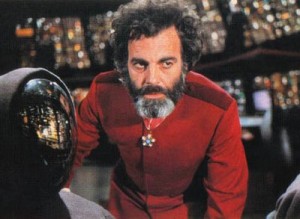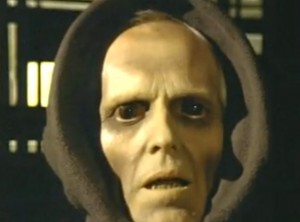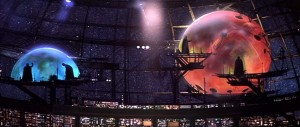
Movies have that peculiar charm about them that even though they can be pretty darn bad, you can still kind of love them. That love can come in a variety of intellectual “scents,” from the pungent stink of gas being pumped on a hot summer day to the giggle-inducing stench of a bean burrito fart. I’m not sure which extreme is the closest analog for Disney’s space epic The Black Hole, but I know the movie is both wonderfully and fatally flawed.
The thought of the flick was spurred on by two events, the first being a remembrance of the film’s score composer John Barry which ran on this site after his passing (and which you can gawk here) and my recent acquisition of the soundtrack, available for the first time from the good folks at Intrada. Each time I was filled with warm thoughts of some of the film’s high points, and consequently reminded of the lowest of the lows.
First, a little background. The film, while arriving in 1979 long after the release of Star Wars, was purportedly being prepped a year before it in 1976. There are some things about that story that didn’t entirely click with me, and how many times have you heard of the also-ran flick that claimed they were the first, but had been plagued by misfortune that held them back? In most of those cases there is the Hollywood trending that finds studios all competing to claim the same concept. It happened with The Abyss, Leviathan and Deep Star Six all trying to hit that underwater thriller button at the same time. Same thing happened with Real Genius, My Science Project and Weird Science. It is easy to assume Disney heard Fox was mounting a big space opera movie that was a hybrid of Flash Gordon and a swashbuckler and thought now was the time for their own.
(Yeah, I’m issuing a spoiler alert for a 32 year old movie. Wanna make something of it?)
And The Black Hole has lots of hybridization in its DNA, a mash-up of Carl Sagan’s Cosmos and Moby Dick with genome strands of film noir and Stanley Kubrick’s 2001: A Space Odyssey chucked in to make the stew extra sticky. Elements like the extended mindgame where the hapless crew of the Palomino departs from the doomed Cygnus, as both slip into the black hole, a kind of umbilical cord between universal realities, are indebted wholly to the Starchild sequence.
But I do go on. For those who haven’t seen it, the spaceship Palomino picks up a distress signal from the periphery of one of the largest black holes ever encountered. A black hole is an anomaly caused when a star goes supernova and creates in its wake a tear in the universal fabric; a vortex of such immense gravitational force that nothing can escape it, not even light. Caught just before its point of no return, the event horizon, is the abandoned, phantom ship the Cygnus. Only now, a scan indicates that there is one life form on the ship, whereas it once had a crew of hundreds.
A member of the Palomino crew had a father that just happened to disappear from the Cygnus. How convenient.
 Once they board, they find that, indeed, there is one human left: Dr. Hans Reinhardt as played by Maximillian Schell. He is surrounded by cloaked robots that run the ship as well as a ruthless red bodyguard called Maximillian (also kind of convenient, when you think about it). Max has a collapsible rotary blade that is quite deadly, appearing in what, up to that point, was the most brutal scene ever attached to a Disney film. Though bloodless, the goring of a crewmember (played by Anthony Perkins) was still completely unexpected.
Once they board, they find that, indeed, there is one human left: Dr. Hans Reinhardt as played by Maximillian Schell. He is surrounded by cloaked robots that run the ship as well as a ruthless red bodyguard called Maximillian (also kind of convenient, when you think about it). Max has a collapsible rotary blade that is quite deadly, appearing in what, up to that point, was the most brutal scene ever attached to a Disney film. Though bloodless, the goring of a crewmember (played by Anthony Perkins) was still completely unexpected.
Mysteries are revealed, dangers are faced, and madness reigns in the mind of Reinhardt as he is consumed by the white whale that is the black hole.
The good things about the film are some of the scenes that linger after the movie is done. That previously mentioned headtrip sequence was also extremely daring for Disney, and the famed meteorite collision was truly something to see on the big screen back in 1979. The revelation that Reinhardt’s dronebots were actually the lobotomized, zombified Cygnus crew, brought to bear when one of them was found limping, was actually rather clever. While it might be too far a step to take by saying the film was prescient, astrophysicists are now claiming that some of the movie’s statements about the black hole and its properties cannot be fully resigned to Fantasyland. That is shocking.
Here’s why: some of the science in this science fiction film is laughably pathetic. Forget about the roaring spaceships in the cold, airless vacuum. All space movies do that now, but what about white hot meteorites that crash through the hull of the Cygnus, roll down channels without melting anything, and the crew that barely cross a foot bridge in front of it? Did anyone or anything get incinerated within its fiery proximity? Nope, not even the bridge it eventually rolls over and smashes.
 More, the hull breach does not suck anything out into space. Everyone seems to maintain their gravitational uprightness through the ship (I know there was a tossed-off remark about gravity-making centrifugal forces, but a damn meteorite just ripped the ship a new one, for crying out loud!) You could go with it if it wasn’t for the scene where a teeny, tiny breach in the hydroponic garden hull almost sucked our heroes into the void, proving that selective physics is totally kick-ass.
More, the hull breach does not suck anything out into space. Everyone seems to maintain their gravitational uprightness through the ship (I know there was a tossed-off remark about gravity-making centrifugal forces, but a damn meteorite just ripped the ship a new one, for crying out loud!) You could go with it if it wasn’t for the scene where a teeny, tiny breach in the hydroponic garden hull almost sucked our heroes into the void, proving that selective physics is totally kick-ass.
As said before, Maximillian the robot is totally pimped out. Good robot VINCENT is, well, a robot egg with googly eyes. He’s still kind of a cool character, until Roddy McDowell’s voiceover dialogue makes you want to strangulate the little twerp. It turns out that VINCENT is a know-it-all nerdroid that never, ever shuts the hell up. Elements that seemed shoehorned into the original concept, post-Star Wars, include robot gunfight showdowns, acts of derring-do that don’t, and occasional stabs at humor that are as funny as real stabs.
Yet I have a real soft spot for this ambitious little stinker. John Barry’s score is very neat, if somewhat hampered by what feels like a Disney imperative to inject brass-laden fanfares that don’t always tonally fit the scene’s mood. Taken independently from the visuals, Barry wins the day. When tied in, not so much. The effects are, for its time, eye-popping. There are moments of genuine tension and steely maturity in the piece, and moments that are so goofy and ignorant of ninth-grade science tenets that you feel dumber for having taken the ride, but take it you do.
They say turkey is, as far as meat goes, fairly healthy for you. I’m not sure The Black Hole, turkey though it might be, is necessarily healthy for you but it won’t hurt you either. It is a product of a time when it didn’t matter if it was factual; only that it blew up on cue. You have to love a movie that is so transparently shameless.
Well, you don’t have to, but I do.
Related articles
- 2 reviews of USS Cygnus (The Black Hole) (rateitall.com)
- Myths About Turkeys (witchesofthecraft.wordpress.com)







Comments